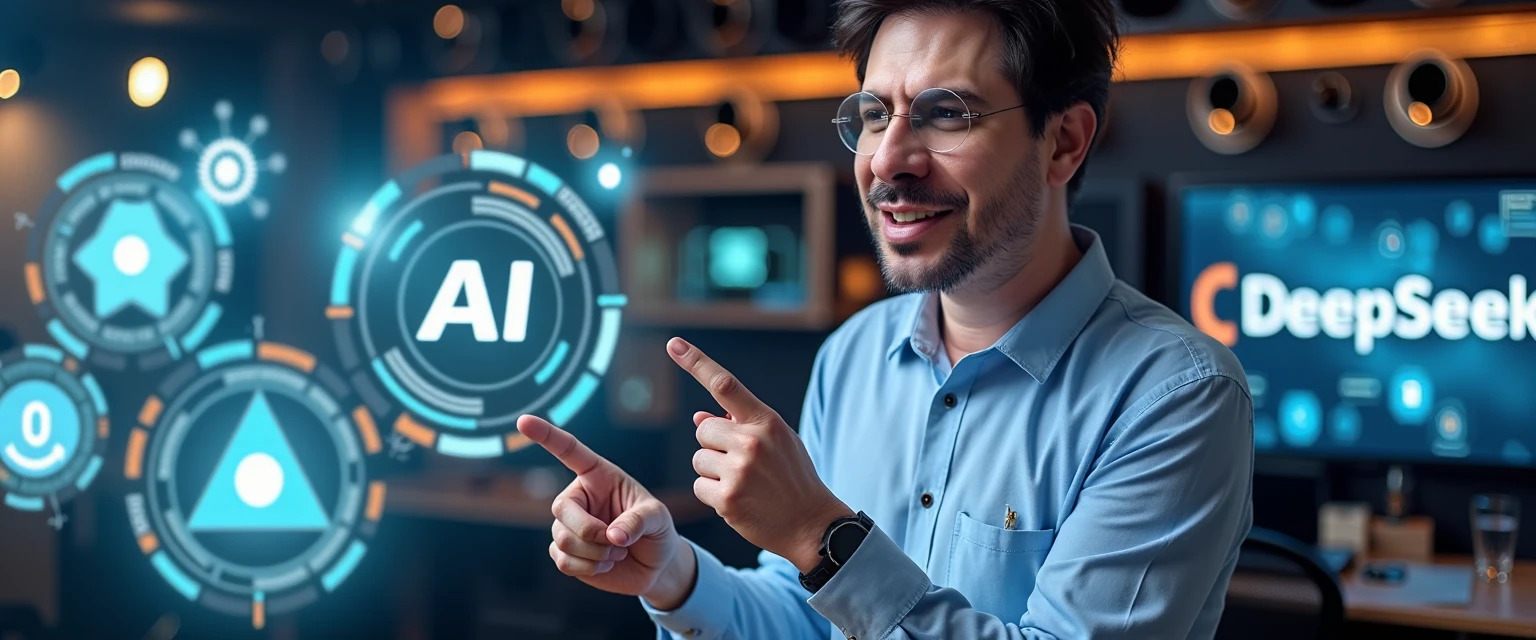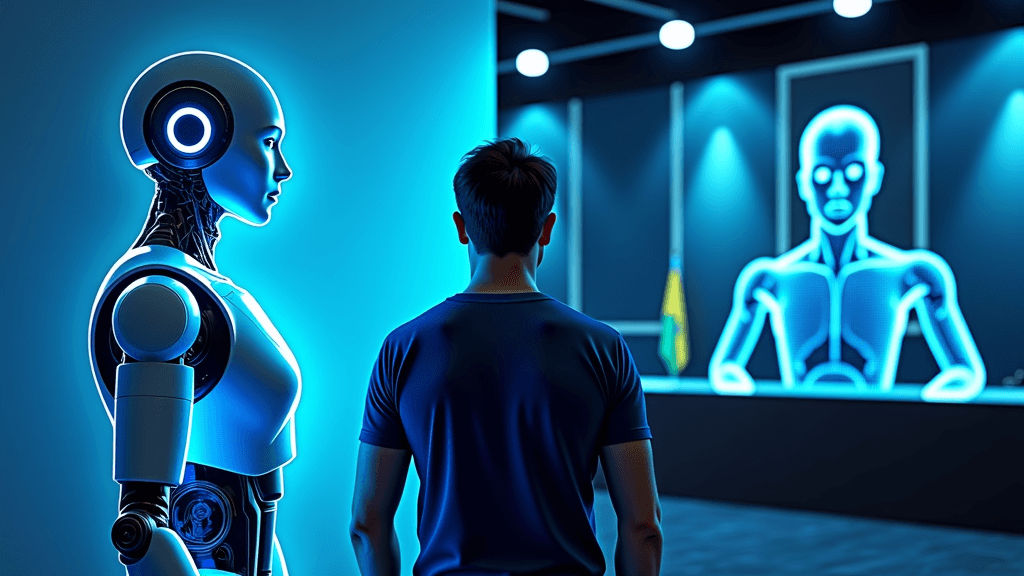AI Radar: Between Risks and Opportunities — How Artificial Intelligence is Transforming Security, Work and Business
June 8, 2025 | by Matos AI

The week that defined the paths of AI in Brazil
The race for artificial intelligence is intensifying globally, and Brazil is not lagging behind. The last 24 hours have brought a fascinating overview of how AI is being implemented, regulated and even feared in different sectors of our society.
What strikes me most at the moment is how we are oscillating between two poles: on one side, major warnings about the risks of technology; on the other, impressive advances in its practical application. It is this delicate balance that we need to navigate as a country.
AI Guardians Warn: Technology in the Wrong Hands
When the CEO of Google’s AI research arm issues a warning, we need to listen carefully. Demis Hassabis, who heads DeepMind, expressed his biggest concern at SXSW in London: it’s not the “jobs apocalypse” that worries him, but rather the misuse of technology by malicious actors. The problem is not the AI itself, but who controls it. Second CNN Brazil, Hassabis emphasized the urgent need for safeguards to control sophisticated, autonomous AI models.
Join my WhatsApp groups! Daily updates with the most relevant news in the AI world and a vibrant community!
- AI for Business: focused on business and strategy.
- AI Builders: with a more technical and hands-on approach.
This concern is echoed in the work of another AI pioneer. Yoshua Bengio, considered one of the “fathers” of the technology, has just launched the organization LawZero, dedicated to creating software capable of preventing abuse by AI agents. As reported by UOL, Bengio is committed to proposing ways to supervise the new generation of AI models, especially as their capabilities increase.
It is significant that the creators of this technology themselves are on the front lines warning about its risks. In my experience working with startups and technology, I see that this type of self-criticism is fundamental to the healthy development of any disruptive innovation.
Regulation: Brazil enters the global debate
President Lula entered the debate by defending global governance mechanisms to curb AI-powered disinformation. During a ceremony in which he received an honorary doctorate from the University of Paris 8, he issued a stark warning: without regulation, AI could make electoral campaigns “100% of lies.” According to the Brazilian Post Office, Lula announced that the topic will be discussed at the next BRICS meeting.
This concern with the veracity of information is extremely relevant. Over the years, following the evolution of startups and technology in Brazil, I have seen how trust is the most valuable asset in any digital ecosystem. Without it, there is no sustainable innovation.
Impact on the labor market: the first signs
One of the most sensitive topics when we talk about AI is its impact on the job market. And recent data is worrying. Dario Amodei, CEO of Anthropic, states that AI is expected to eliminate up to 50% of junior level jobs in 5 years. According to the UOL, data from the Federal Reserve Bank shows that the unemployment rate among college graduates rose 30%.
Recent graduates are at the forefront of this transformation, and this requires a deep reflection on how we are preparing our young people for the market. In my mentoring sessions with entrepreneurs, I always emphasize that we need to focus not only on technical skills, but also on those that are genuinely human and difficult to automate.
Transformation in sectors: from finance to health
While we debate the risks, AI continues to advance in impressive practical applications. Banco do Brasil became the first bank in the country to apply artificial intelligence in the interaction and application suggestions for individual customers. As reported by Brazil Agency, the Minhas Finanças Multibanco tool now operates with generative AI solutions, reinforcing customers' financial education.
In the healthcare sector, the debate over the use of ChatGPT for medical diagnostics is just beginning. Experts warn of the risks of inaccurate diagnoses and self-medication, as reported by GZH. The message is clear: AI should be a supportive tool, not a substitute for clinical judgment.
This balance between automation and human expertise is something I have been advocating for years in the innovation ecosystem. It is not about replacing, but about expanding human capabilities.
Surprising innovations: from oceans to entertainment
The creativity in the application of AI continues to amaze me. German company Helsing plans to create AI-integrated submarines to monitor shipping routes and track threats in the oceans. According to the Digital Look, the Lura system uses AI to identify underwater threats and sounds in real time, functioning as true “ocean satellites”.
In the entertainment field, virtual presenter Marisa Maiô has become a phenomenon on social media. The AI-generated character has already closed advertising contracts and raises discussions about the impact of technology on the creative sector, as reported by Exam.
In journalism, Pulitzer Prize winners have used machine learning to analyze data in their reporting, showing how AI can add agility and rigor to investigative work, as Poder360.
The path to a more inclusive Brazilian AI
THE State published an interesting analysis on how AI can transform sectors such as health, economy, housing and justice in Brazil. The central point is that, if used well, technology can increase the efficiency of public services and promote better service to citizens.
However, there is an important warning: the need for digital inclusion to prevent technology from worsening existing inequalities. This is a topic that is particularly close to my heart. Throughout my career supporting startups, I have always argued that technology needs to be a factor of inclusion, not exclusion.
Democratizing access to AI is not just a social issue, but also an economic one. A country that can integrate its entire population into the digital revolution will have a huge competitive advantage on the global stage.
What can we expect in the near future?
Looking at these trends, I see five clear directions for AI in Brazil in the coming months:
- Regulatory advancement: The debate over rules for the use of AI is likely to gain momentum, especially as elections approach.
- Accelerated transformation of the financial sector: Banks and fintechs will be the first to adopt AI on a large scale for consumer services.
- Pressure in the job market for recent graduates: We will need to rethink the university-business transition.
- Growth of AI solutions for security: Both physical and digital, including combating disinformation.
- AI-generated content boom: With ethical and legal issues that will need to be resolved quickly.
How to prepare for this scenario?
As entrepreneurs and leaders, we need to understand that AI is not just a technology, but a new paradigm that is reshaping all sectors of the economy. In my mentoring sessions, I have guided startups to view AI not as a threat, but as an opportunity to create value.
Some strategies have proven particularly effective:
- Focus on real problems where AI can bring significant efficiency gains
- Ensure implementation is ethical and transparent, building trust
- Invest in developing complementary AI skills within the team
- Seek strategic partnerships to accelerate technology adoption
In my consulting work with companies looking to innovate with AI, I have seen that those that manage to balance technological advancement with solid human values are the ones that thrive most in this new scenario.
Final considerations
AI is rapidly moving from being a technology of the future to becoming a reality in virtually every sector of the Brazilian economy. What we have seen in the news over the last 24 hours is just a glimpse of the profound transformation that is underway.
As a country, we have the opportunity to chart our own path to AI adoption – one that reflects our values, prioritizes inclusion, and leverages our competitive advantages. This will require dialogue between government, business, academia, and civil society.
And for us, entrepreneurs and leaders, this moment demands courage to innovate, but also responsibility to consider the social impacts of our creations. It is a delicate but necessary balance.
In my mentoring work with startups and strategic consultancies, I have been dedicating more and more time to helping companies find this balance between innovation and responsibility. Because I believe that this is the path not only to business success, but to a more prosperous and fair society.
The AI revolution is just beginning. And Brazil has all the conditions to be a protagonist in this new era – as long as we make the right choices now.
✨Did you like it? You can sign up to receive 10K Digital's newsletters in your email, curated by me, with the best content about AI and business.
➡️ Join the 10K Community here
RELATED POSTS
View all



